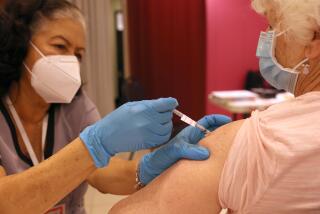Justices Rule U.S. Isn’t Liable for Deaths, Illnesses in A-Tests : Will Hear Vaccine Case; Lets Die Some Agent Orange Suits
WASHINGTON — The Supreme Court today refused to hold the government financially responsible for deaths and diseases allegedly caused by years of open-air atomic weapon tests in Nevada.
The court, without comment, turned away an appeal by about 1,200 people who themselves lived downwind from the test site or had relatives who lived in Nevada, Arizona and Utah.
In another action, the court agreed to decide whether the government may be forced to pay damages when a vaccine it licenses causes the disease it was intended to prevent. And it let die some, but not all, of the lawsuits filed by Vietnam veterans against seven manufacturers of the herbicide Agent Orange.
The federal government, under the aegis of the Atomic Energy Commission, conducted more than 100 atomic weapon tests between 1951 and 1962.
A 1979 lawsuit filed in Utah contended that the radioactive fallout from those tests caused numerous deaths and diseases, such as cancer and leukemia.
The suit charged that the government negligently failed to monitor test results and to warn about the fallout hazards.
10 Claims Upheld
A federal trial judge, after reviewing the claims of 24 of the plaintiffs, ruled that 10 of them could recover monetary damages. U.S. District Judge Bruce Jenkins said the government was liable for a negligent failure to follow the commission’s public-safety guidelines.
The judge said the claims of the other plaintiffs could proceed under the Federal Tort Claims Act, a law that allows people to sue the otherwise legally immune federal government.
But the U.S. 10th Circuit Court of Appeals reversed Jenkins’ ruling last April 20.
The appeals court said that the atomic testing program’s public information plans could not be held liable under the tort act because it amounted to a “discretionary function” not subject to government liability.
In a concurring opinion, Judge Monroe McKay said, “While we have great sympathy for the individual cancer victims who have borne alone the costs of the AEC’s choices, their plight is a matter for Congress.”
The justices today refused to overrule the appeals court’s decision.
Will Hear Vaccine Appeal
In the vaccine case, the justices said they will hear an appeal by the parents of a Pennsylvania boy who contracted polio after receiving a dose of oral vaccine.
The Reagan Administration, which supports broad immunity for the government in such instances, nonetheless urged the court to hear arguments in the case to eliminate confusion in lower courts.
In the Agent Orange case, the court let stand rulings that the manufacturers, as military contractors, are immune from being sued over the alleged health effects of the herbicide.
In another case, the court agreed to decide whether communities may ban all picketing of private residences. The court said it will review rulings that such a ban imposed by the Milwaukee suburb of Brookfield, Wis., violated free-speech rights.
More to Read
Get the L.A. Times Politics newsletter
Deeply reported insights into legislation, politics and policy from Sacramento, Washington and beyond. In your inbox three times per week.
You may occasionally receive promotional content from the Los Angeles Times.










